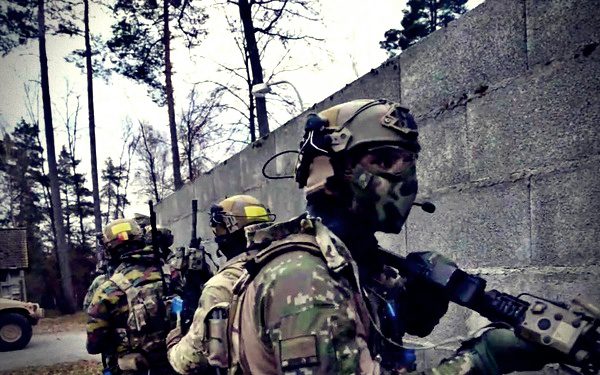“The staff judge advocate or legal advisor shall provide the [CA] with a copy of the report of results of the trial, setting forth the findings, sentence, and confinement credit to be applied, a copy or summary of the pretrial agreement, if any, any recommendation for clemency by the sentencing authority, made in conjunction with the announced sentence, and the staff judge advocate’s recommendation.” RCM 1106(d)(3). EFFECTIVE: 23 AUGUST 2008.
Findings and sentence.
United States v. Russett, 40 M.J. 184 (C.M.A. 1994). The requirement for the SJA to comment on multiplicity questions arises when DC first raises the issue as part of the defense submission to the CA, Military Sex Crimes.
Accuracy is most critical on charges and specifications. United States v. Diaz, 40 M.J. 335 (C.M.A. 1994) (the CMA disapproved findings on two specs omitted from PTR). See also United States v. Sanchez, 54 M.J. 874 (A. Ct. Crim. App. 2001) (error in PTR alleging a finding of guilty to larceny as opposed to wrongful appropriation, however, no prejudice – finding of guilty to larceny set aside and replaced with a finding of guilty to wrongful appropriation and sentence affirmed after reassessment). United States v. Lindsey, 56 M.J. 850 (A. Ct. Crim. App. 2002). Finding of not guilty to specification reported in PTR as guilty. DC failed to comment on the error.
Applying a waiver and plain error analysis, the court held plain error; therefore, the waiver did not apply. Unsure on the issue of prejudice, the court reduced the sentence by two months. “We are unsure of the impact of the error on appellant’s request for clemency. To moot any possible claim of prejudice . . . and for the sake of judicial economy, we will take appropriate remedial action.” Id . at 851. But see United States v. Ross, 44 M.J. 534, 536 (A.F. Ct. Crim. App. 1996) (improper dates for offense in PTR – July vs. Sept. – not fatal when CA action reflected original, correct date of charge sheet; “we are reluctant to elevate ‘typos’ in dates to ‘plain error’” especially when waived).
Some errors are indulged, Article 120 UCMJ, especially when the defense does not notice or point them out. See, e.g., United States v. Royster, No. 9400201 (A. Ct. Crim. App. 1995) (unpublished); United States v. Bernier, 42 M.J. 521 (C.G. Ct. Crim. App. 1995); United States v. Zaptin, 41 M.J. 877 (N-M. Ct. Crim. App. 1995). United States v. Gunkle , 55 M.J. 26 (C.A.A.F. 2001). The PTR failed to reflect that the judge granted motions for a finding of not guilty and/or modification of charges. The defense failed to mention these errors in their RCM 1105/6 submissions but did mention the judge’s favorable rulings. The court found no error.
Maximum punishment. Not a required element; if done, ensure accuracy. See United States v. Hammond, 60 M.J. 512 (A. Ct. Crim. App. 2004) (reducing confinement by thirty days when the PTR misstated the maximum punishment (life w/o possibility for parole when a maximum was only six years)).
Any clemency recommendations by the MJ or panel. RCM 1106(d)(3) [2008change].
United States v. Paz-Medina, 56 M.J. 501 (A. Ct. Crim. App. 2001). Plain error for the SJA to omit member’s clemency recommendation regarding waiver of forfeitures from the PTR. CA action set aside; returned for new PTR and action. Court also commented on the slow post-trial processing stating, “[b]ecause we are already returning the case for a new SJAR and action, the new SJA and convening authority will also be provided a discretionary opportunity to fashion an appropriate remedy for the untimely processing.” Id . at 505.
United States v. Williams, 57 M.J. 1 (C.A.A.F. 2002). Error found where the government failed to serve DC with PTR prior to action when PTR omitted clemency recommendation from sentencing authority.
Summary of accused’s service record. Required by the old, pre-23 August 2008, R.C.M. 1106(d)(3)(C), but not the new R.C.M. 1106. Under the new R.C.M. 1106(d)(1), the SJA “ shall use the record of trial in preparation of the recommendation, and may also use the personnel records of the accused or other matters in advising the [CA] whether clemency is warranted.” (emphasis added).
United States v. DeMerse, 37 M.J. 488 (C.M.A. 1993). Failure to note Vietnam awards and decorations was plain error, requiring that action be set aside.
United States v. Czekala , 38 M.J. 566 (A.C.M.R. 1993). Error in omitting JSCM waived by failure to comment.
United States v. McKinnon, 38 M.J. 667 (A.C.M.R. 1993). Failure to comment on the omission of several awards and decorations equals waiver.
United States v. Thomas, 39 M.J. 1078 (C.G.C.M.R. 1994). SJA is not required to go beyond ROT and the accused’s service record in listing medals and awards in PTR.
United States v. Perkins, 40 M.J. 575 (N.M.C.M.R. 1994). SJA may rely on the accused’s official record in preparing PTR. No need to conduct an inquiry into the accuracy of the record, particularly where the accused does not question.
United States v. Berwick, 47 M.J. 730 (N-M. Ct. Crim. App. 1997). SJA PTR failed to list SW Asia service awards. Held – waived by DC, and no plain error. Distinguishes DeMerse, because those were combat awards, and old, which set DeMerse apart from other soldiers (so few remaining on active duty).
United States v. Osuna, 56 M.J. 620 (C.G. Ct. Crim. App. 2001). SJA PTR summarized the accused’s service record by reference to enclosures. For example, the accused’s awards are at enclosure 2, performance summary at enclosure 3, and nonjudicial punishment at enclosure 4. Held: summary was sufficient. Note: PTR erroneously stated that the accused was sentenced, in a judge-alone trial, by members. The court found error but not plain error, no prejudice, and waiver by failing to timely object to the error. See also United States v. Kittle, 56 M.J. 835 (A.F. Ct. Crim. App. 2002) (no error in SJAR by the inclusion of complete nonjudicial punishment actions in lieu of summarizing them).
United States v. Mack, 56 M.J. 786 (A. Ct. Crim. App. 2002). SJAR need not include awards and decorations which are not supported by the accused’s service record admitted at trial (e.g., ORB) or established by stipulation of the parties. Failure to mention the accused’s Purple Heart was not an error, “plain or otherwise.” Id . at 790. Additionally, SJA’s characterization of the accused’s service as “satisfactory” was not an error. Finally, SJA need not comment on the accused’s clemency submission absent allegation of legal error. “The appellant suggests that we equate the SJA’s decision not to comment on the appellant’s extensive clemency matters as tantamount to disagreeing with or disputing matters in the appellant’s RCM 1105 submission. We are aware of no authority to support the appellant’s position, and we decline to establish such authority.” Id.
United States v. Wellington, 58 M.J. 420 (C.A.A.F. 2003). Prejudicial error for the SJAR in an indecent assault, attempted rape and attempted forcible sodomy to misstate the appellant’s prior disciplinary actions. The SJAR indicated the appellant received two prior Field Grade Article 15s when in fact he had never received NJP. Additionally, the SJAR indicated no pretrial restraint when in fact the appellant was restricted prior to trial.
Applying a plain error analysis (RCM 1106(f)(6)) because the defense counsel failed to comment on the erroneous SJAR, the court found that the errors were both “‘clear’ and ‘obvious’.” Next, the court found prejudice from the error which, despite a service record lacking in any disciplinary action, “portrayed [the appellant] as a mediocre soldier who had twice received punishment from a field grade officer . . . . Appellant’s ‘best hope for sentence relief’ was dashed by the inaccurate portrayal of his service record.”
Held: the erroneous SJAR amounted to plain error and the court would not speculate on what the CA would do if accurately advised by the SJA; the case was remanded for a new SJAR and action. j) United States v. Sanchez, 69 M.J. 679 (C.G. Ct. Crim. App. 2010). The SJAR contained the fact that the appellant had no previous convictions, information about a prior nonjudicial punishment, and a list of four negative administrative remarks. There was no mention of the appellant’s awards and decorations or positive marks. The court found this to be a prejudicial error and remanded the case for a new SJAR and action. Even though there is no requirement to summarize the accused’s service records under the amendment to R.C.M. 1106(d), any summary must be “balanced” and “a fair portrayal.”
Nature and duration of any pretrial restraint.
“The accused was under no restraint;” or
“The accused served 67 days of pretrial confinement, which should be credited against his sentence to 8 years confinement.”
United States v. Scalo, 60 M.J. 435 (C.A.A.F. 2005). SJAR erroneously advised theCA that there had been no pretrial restraint in the appellant’s case. In fact, the appellant had been restricted to the limits of Fort Stewart, Georgia for forty-four days until his court-martial. The court determined that the SJA’s failure to advise the CA regarding the appellant’s pretrial restraint was not inherently prejudicial and that appellant failed to make a colorable showing of possible prejudice. The appellant failed to make a reference, direct or indirect, in his clemency petition. Further, the length alone of the restraint, was not of an unusual length to attract the convening authority’s attention for clemency purposes.
United States v. Weber, 56 M.J. 736 (C.G. Ct. Crim. App. 2002). Error for SJA to omit from PTR that accused was subject to over three months of pretrial restriction; however, applying United States v. Wheelus, 49 M.J. 283 (C.A.A.F. 1998), accused failed to “make some colorable showing of possible prejudice” that would warrant relief.
United States v. Miller, 56 M.J. 764 (A.F. Ct. Crim. App. 2002). SJAR failed to mention three days of pretrial confinement. Held: attachments to SJAR (e.g., Report of Result of Trial and Personal Data Sheet) both stated three days of PTC; therefore, no error. Even if error, applying United States v. Wheelus, 49 M.J. 283 (C.A.A.F. 1998), accused failed to make a “colorable showing of prejudice” that would warrant relief. Finally, the court noted that the accused waived the issue by failing to raise a timely objection in the absence of plain error.
CA’s obligation under any pretrial agreement. See United States v. Green, 58 M.J.855 (A. Ct. Crim. App. 2003); United States v. Sheffield, 60 M.J. 591 (A.F. Ct. Crim. App. 2004) (failure of the SJAR to notify the CA of his obligations regarding waiving automatic forfeitures was an error). The 2008 amendment to RCM 1106(d)(3) requires a “copy or summary of the pretrial agreement.”
The SJAR. RCM 1106(d)(3). The pre-2008 RCM 1106 only required a “specific recommendation as to the action to be taken by the [CA] on the sentence.” Pre-23 August 2008 RCM 1106(D)(3)(F).
Nothing else should be included.
Legal sufficiency need not be reviewed. Exceptions:
If the SJA deems it appropriate to take corrective action on findings or sentences; or
If the accused alleges a legal error in the RCM 1105 submission.
United States v. Drayton, 40 M.J. 447 (C.M.A. 1994). Weighing of evidence supporting findings of guilt limited to evidence introduced at trial.
United States v. Haire, 40 M.J. 530 (C.G.C.M.R. 1994). Legal issues raised in RCM 1105 submission not discussed in SJA recommendation; addressed for the first time in an addendum. No proof that the addendum was served on DC. Action set aside. 10. Additional appropriate matters may be included in the recommendation even if taken from outside the record. RCM 1106(d)(5). See United States v. Due, 21 M.J. 431 (C.M.A. 1986). See also United States v. Drayton, 40 M.J. 447 (C.M.A. 1994). Key – service on accused and counsel and opportunity to comment!
